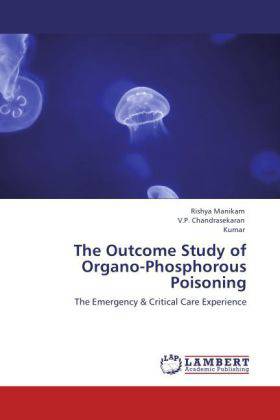
Bedankt voor het vertrouwen het afgelopen jaar! Om jou te bedanken bieden we GRATIS verzending (in België) aan op alles gedurende de hele maand januari.
- Afhalen na 1 uur in een winkel met voorraad
- In januari gratis thuislevering in België
- Ruim aanbod met 7 miljoen producten
Bedankt voor het vertrouwen het afgelopen jaar! Om jou te bedanken bieden we GRATIS verzending (in België) aan op alles gedurende de hele maand januari.
- Afhalen na 1 uur in een winkel met voorraad
- In januari gratis thuislevering in België
- Ruim aanbod met 7 miljoen producten
Zoeken
The Outcome Study of Organo-Phosphorous Poisoning
The Emergency & Critical Care Experience
Rishya Manikam, V. P. Chandrasekaran, Kumar
Paperback | Engels
€ 63,45
+ 126 punten
Omschrijving
Insecticide poisoning namely the organophosphorous compound is a major health burden in the developing countries of Asia and Africa. It affects approximately 3 million people worldwide and causes about 200,000 deaths annually in developing countries. A hospital based study suggests that nearly half of the admissions to emergency department in developing country with acute poisoning are due to organophosphorous. The clinical manifestations of organophosphorous poisoning is a results of cholinergic over activity.It can be divided into over stimulation of the muscarinic , nicotinic or the CNS receptors.It is of paramount important to study the outcome in patients with organophosphorous consumption.By doing this,many of the post ingestion complication can be addressed appropriately.With the understanding of the disease process will help us to draw up a appropriate strategy in managing them.
Specificaties
Betrokkenen
- Auteur(s):
- Uitgeverij:
Inhoud
- Aantal bladzijden:
- 104
- Taal:
- Engels
Eigenschappen
- Productcode (EAN):
- 9783846534403
- Verschijningsdatum:
- 22/12/2011
- Uitvoering:
- Paperback
- Afmetingen:
- 152 mm x 229 mm
- Gewicht:
- 163 g

Alleen bij Standaard Boekhandel
+ 126 punten op je klantenkaart van Standaard Boekhandel
Beoordelingen
We publiceren alleen reviews die voldoen aan de voorwaarden voor reviews. Bekijk onze voorwaarden voor reviews.









